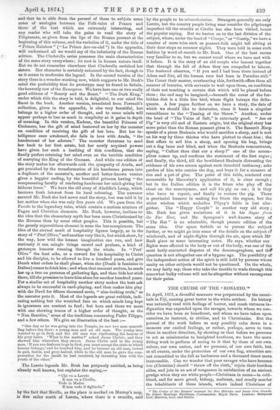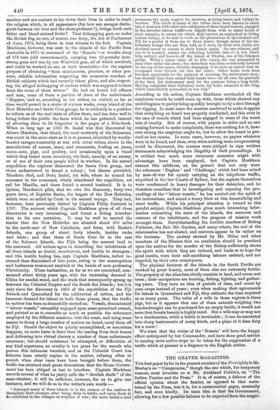THE CRUISE OF THE ROSARIO."
IN April, 1873, a dreadful massacre was perpetrated by the canni- bals in Fiji, causing great terror to the white settlers. Its history was naturally read with feelings of horror, and much virtuous in- dignation was expended upon the savages, towards whom we con- sider we have been so beneficent, and whom we have taken upon ourselves.to instruct, to civilise, and to Christianise. But the perusal of the work before us may possibly calm down in a. measure our excited feelings, or rather, perhaps, serve to turn them in another direction, by showing us that before we presume to act as missionaries to benighted heathens, we have the more fitting work to perform of seeing to it that by those of our own, colour, our own nation, and we presume, of our own faith, but at all events, under the protection of our own flag, atrocities are not committed to the full as barbarous and a thousand times more inexcusable. Can we wonder that poor savages who have become- /otu (Christian) should "throw off the cloth," rejoin their heathen allies, and join in an act of vengeance in satisfaction of an ancient grudge when they see white people—Christians in name—in cold- blood, and for mere greed, kidnap, maltreat, and cruelly murder the inhabitants of those islands, where indeed Christians of * The Cruise of the Rosario' amongst the New Hebrides and Santa Cruz Islands. By Albert Hastings Markham, Commander, Royal Navy. London: Sampson Low, Marston, Low, and Searle.
another sort are content to lay down their lives in order to teach the religion which, to all appearance (for how can savages distin- guish between the true and the sham professor ?), brings forth such titter and blood-stained fruits ? That kidnapping goes on under the British flag no one, of course, can deny, the Act of Parliament of June, 1872, being there to bear witness to the fact. Captain Markham, however, was sent to the islands of the Pacific from Australia in 1871 in command of the Rosario '—a wooden sloop of 673 tons (old measurement), carrying two 42-pounder Arm- atrong guns and one 6i-ton Woolwich gun, all of 'which revolved, and could be worked on one or both broadsides—for the express ,purpose of obtaining "from missionaries, planters, or other per- -sons, reliable information respecting the numerous murders of British subjects which had recently taken place, and also respect- ing the alleged kidnapping of natives which was supposed to have 'been the cause of those crimes." He had on board 145 officers and men, some of them a portion of those of the unfortunate MegLera,' and as, according to his orders, he visited, as far as time would permit in a cruise of sixteen weeks, every island of the New Hebrides and Santa Cruz groups, he is evidently in a position to inform us of the real state of affairs there, and has done well to bring before the public the facts which he has gathered, instead -of allowing them to lie forgotten in the pages of a Blue-book. When so long ago as 1364 St. Isabel was first discovered by Alvaro Mendaila, that island, the most northerly of the Solomons,
as much in the name state as it is at present, inhabited by woolly- beaded savages constantly at war with other tribes, clever in the manufacture of canoes, arms, and ornaments, feeding on yams, -cocoa-nuts, pigs, and poultry, and occasionally upon a viand which they found more succulent, the flesh, namely, of an enemy, -or of one of their own people killed in warfare. In his second expedition the explorer discovered the Santa Cruz group, and there endeavoured to found a colony ; but disease prevailed, Mendacia died, and Dolls Isabel, his wife, whom he named his asuccessor in the command, wisely abandoned the expedition, set sail for Manilla, and there found a second husband. It is to Quiros, Mendafia's pilot, that we owe the discovery, forty-two years later, of Espiritu Santo, the largest of the New Hebrides, which were so called by Cook in his second voyage. They had, 'however, been previously visited by Captain Philip Carteret in 1767. The account which Captain Markham gives of all these -discoveries is very interesting, and forms a fitting introduc- tion to his own narrative. It may be well to remind the reader that the New Hebrides are situated about 200 miles to the north-east of New Caledonia, and form, with Banks's Islands, one group of about forty islands, besides rocks and islets ; and that those of Santa Cruz lie to the east of the Solomon Islands, the Fijis being the nearest land to the eastward. All writers agree in describing the inhabitants of all these islands as brutal, treacherous, and hostile to strangers ; and this hostile feeling has, says Captain Markham, rather in- creased than diminished of late years, owing to the unscrupulous and barbarous treatment received at the hands of men professing Christianity. These barbarities, as far as we are concerned, com- menced about thirty years ago, with the increasing demand in China for sandal-wood, and the trade that consequently sprang up between the Celestial Empire and the South Sea Islands ; but it is -only since the discovery in 1860 of the capabilities of the Fiji Islands and Queensland for the cultivation of cotton, and the immense demand for labour in both those places, that the traffic in natives has been so shamefully carried on. Vessels, denominated 4. labour vessels," ostensibly engaged upon some permitted errand, and painted so as to resemble as much as possible the schooners -employed by the different missions, visit the coast, and using some means to decoy a large number of natives on board, carry' them off to Fiji. Should the object be quietly accomplished, as sometimes happens, no more harm is done than the tearing from their homes and delivering into virtual slavery a number of these unfortunate -creatures ; but should resistance be attempted, or difficulties of any kind supervene, no cruelty is too great for the rascals who Trursue this infamous vocation, and as the Colonial Court has hitherto been utterly supine in the matter, refusing often to famish when clear cases have been brought before them, the traffic has attained such great dimensions that the Home Govern- ment has been obliged at last to interfere. Captain Markham fecords several of what be justly calls the "devilish deeds" of the man-stealers ; it will be sufficient, however, for us to give one instance, and we will do so in the writer's own words :— " Amongst many of these islands it is the custom of the natives to decapitate their enemies after being slain in battle, and carry them to be exhibited in the villages as trophies of war; the more heads a man possesses, the more respect he receives, as being brave and valiant in warfare. The chiefs of many of the tribes have been known to enter into a contract with white men—skippers of these honest vessels, engaged in the harmless labour traffic—to supply them with so many beads of their enemies, in return for which they receive an equivalent in living human beings, to be sent to work on the plantations in Queensland and Fiji for a period of from one to three years; though many of the un- fortunate beings who are thus sold, as it were, by their own chiefs, are destined never to return to their homes again. An eye-witness, and one to be trusted, relates the following horrible tale A low black brig arrived, and hove-to off the island of Florida, one of the Solomon group. When a canoe came off to this vessel, she was persuaded to pass close under the stern ; the stern-boat was thou accidentally lowered on the top of the canoe, thereby damaging it to such an extent that its occupants were thrown out into the water. Other boats were then lowered, apparently for the purpose of rescuing the unfortunate men; but directly they were seized their heads were cut off over the gunwale of the boat, the instrument used for the purpose being a long knife. Having completed their diabolical work, the boats returned to the brig, which immediately proceeded on her way."
According to his orders, Captain Markham overhauled all the suspicious vessels he could come up with, those which showed any unwillingness to parley being speedily brought to by a shot through the rigging. In most cases the masters contrived to make it appear that everything on board was properly conducted, and this even in the case of vessels which had been engaged in some of the worst acts of cruelty. But of course, with papers in order and no one coming forward to make complaints, there was nothing for it, how- ever strong the suspicion might be, but to allow the vessel to pro- ceed on her course. In some cases, however, no papers whatever were to be found, and then, even when nothing more compromising could be discovered, the masters were ;obliged to sign written statements acknowledging the illegality of their proceedings. It is evident that much more strenuous measures might with advantage have been employed, but Captain Markham excuses this mildness, on the ground that not only were the schooners 'Daphne' and 'Challenge,' which had been seized by men-of-war for openly carrying on the iniquitous traffic, acquitted in the law Courts of Sydney, but the captors themselves were condemned in heavy damages for their detention, and he therefore considers that in investigating and exposing the pro- ceedings of the "labour vessels," he has carried out the spirit of his instructions, and aimed a heavy blow at this demoralising and cruel traffic. While his principal attention is turned to this painful subject, Captain Markham gives much interesting infor- mation concerning the state of the islands, the manners and customs of the inhabitants, and the progress of mission work amongst them. Notwithstanding the terrible murders of Bishop Patteson, the Rev. Mr. Gordon, and many others, the zeal of the missionaries has not abated, and converts appear to be rather on the increase. The anxiety showed by Mr. Milne and other members of the Mission that no retaliation should be practised upon the natives for the murder of the Bishop sufficiently shows the spirit with which they are imbued, and leads us to hope for good results, were their self-sacrificing labours assisted, and not impeded, by their own countrymen.
The physical features of the islands in the South Pacific are marked by great beauty, most of them also are extremely fertile. The property of the islanders chiefly consists in land, and cocoa-nut trees ; their occupations are hunting, fishing, fighting, and gather- ing yams. They have no idea of periods of time, and count by yam-crops instead of years ; even when making their agreements for labour in Queensland and Fiji, they estimate the time required as so many yams. The value of a wife in those regions is three pigs, but as it appears that one of these animals weighing two hundredweight can be purchased for an empty bottle, it would not seem that female beauty is highly rated. But a wife may or may not be a desideratum, while a bottle is invaluable ; it can be converted into sharp instruments of many kinds, and a piece of it does duty for a razor !
We trust that the cruise of the'Rosario' will have the happy effect anticipated by her Commander, and have done good service in causing more active steps to be taken for the suppression of a traffic which at present is a disgrace to the English nation.



































 Previous page
Previous page